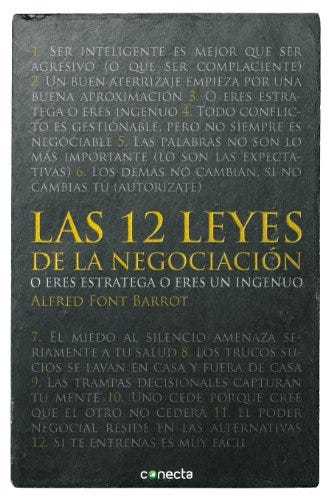Happy Monday!
This week’s book is
It is full of practical and actionable advice for having a better approach at negotiations. Every single day we negotiate so we might as well improve that valuable skill.
Here’s my top 10 takeaways:
Perspective
Although they appear to be adversaries, negotiators are above all co-responsible for resolving a problem.
Do not only consider the positions, look at what may be behind, think in terms of interests, yours and of the other party.
Imagine various combinations to make various possible agreements.
Externals
Manage your time regardless of outside pressure. Reserve some room for maneuver.
Always act on principle, not pressure. Showing haste is showing weakness.
Managing
Generosity and good intentions must be well managed.
It is better to be solicited than to beg, to be called than to call.
Pre-seeing
If you want the painter to finish the task properly and leave everything in perfect condition, never pay in advance.
The good strategist knows that a significant amount must be left unpaid in order for the painter to have an incentive to quickly repair defects in his work.
Questioning
As in all strategic problems, as soon as you ask yourself the right question, the answer emerges naturally.
The key is asking better questions every time.
Temptations
When the structure of the game encourages betrayal, it will occur.
When future interactions can be foreseen, betrayal is no longer profitable.
If there is a future, cooperation increases.
Commitment
Once you have committed to one direction, you lose ‘negotiability’.
Once you are trapped, you can't escape without paying a ransom. If you think it is too high, you prefer to stay inside the trap.
Why do you think that printer ink is more expensive than the printer?
Before entering a structure, anticipate.
Expectations
The adversary will always try to manipulate your expectations.
Whoever can manipulate our expectations will also be able to manipulate our behavior.
Speaking
Many times the problem is not a lack of communication but an excess of unnecessary words.
Know how to keep quiet when you have already said what you had to say, even if the other does not respond.
Power
The one who needs the other the most is the one with the least negotiating power.
Negotiating power resides in the alternatives.
What could you do on your own if you don’t agree?
“What can I give that costs little to me and is worth a lot to the other party in exchange for something that costs little to her and is worth a lot to me?.”
— Alfred Font Barrot
Until next week,
What did you think of today's email?
With your feedback, we can improve Bibliosophy. Click on a link to vote:








